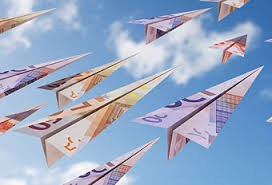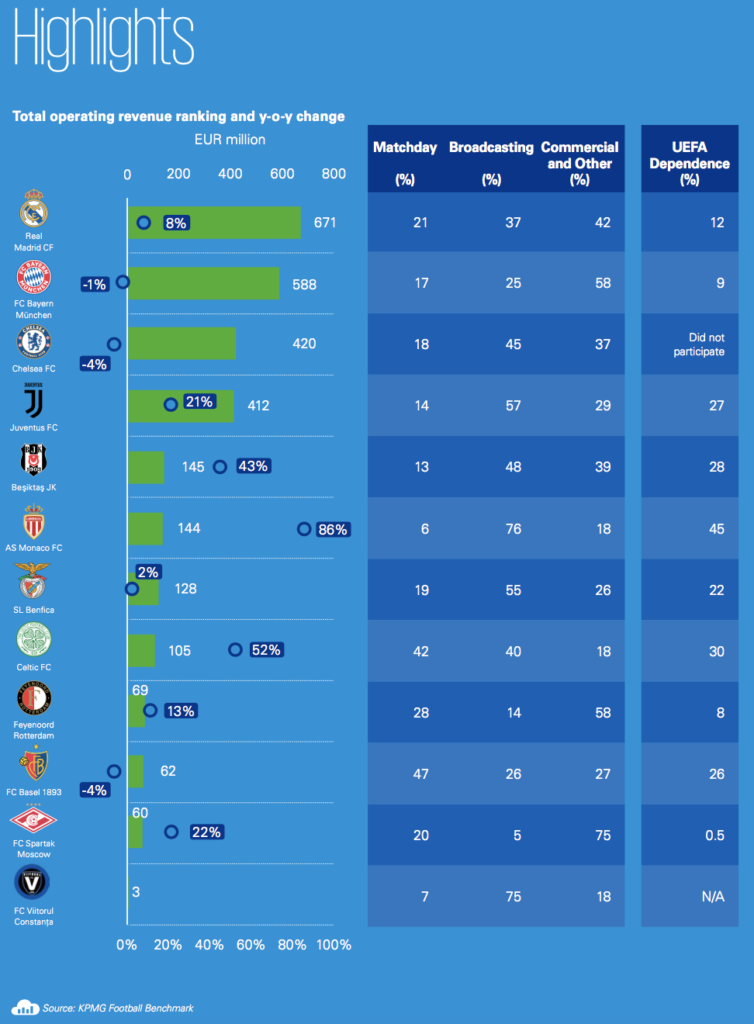By Paul Nicholson
January 16 – Almost half of Europe’s champion clubs rely on UEFA competitions for 25% or more of their revenue, but it comes at a cost. For Real Madrid that was a 32% increase in staff costs to €406 million, the highest wage bill in world football and accounting for 61% of the club’s revenues.
In contrast German champions Bayern Munich had the lowest payroll-to-revenue ratio (45%) of the 12 national league champions analysed in the second edition of KPMG’s Football Benchmark report. AS Monaco, at 69%, had the highest payroll-to-revenue ratio.
The Football Benchmark report analyses the 2016/17 season’s most relevant business performance indicators of the domestic champions from 12 European leagues – AS Monaco, Beşiktaş JK, Celtic, Chelsea, Basel 1893, Bayern München, Spartak Moscow, FC Viitorul Constanţa, Feyenoord, Juventus, Real Madrid and Benfica.
All the clubs in the analysis reported a financial year which the authors say “highlights the shift of the football industry towards sustainability.” Even so it is a sustainability that has some major difference in commercial metrics, and for some a major reliance (and perhaps dangerously over-reliance) on European success and the UEFA payments that brings, with perhaps Monaco being the biggest example.
The French champions were the unexpected winners of Ligue 1 in 2016/17, in a season that also saw them reach the semi-finals of the Champions League. Their on-pitch results catapulted them into a bigger revenue league, earning €44 million (an 86% year-on-year increase) but still only a quarter of Paris Saint-Germain’s revenues and, as the report authors point out, “also lower than the €198 million enjoyed by Olympique Lyon.”
The €68 million they received from UEFA being the key driver of the revenue increase – the club played in front of an average home crowd of just 9,466 in a stadium which has a capacity of 16,500.
Monaco’s success came on the back of a 20% increase in staff costs to €98.8 million, but the UEFA money drove the staff costs/revenue ratio down from an unsustainable 107% to a more sustainable 69%.
Andrea Sartori, KPMG’s Global Head of Sports and the report’s author, said: “One of the main challenges affecting football clubs in recent years has concerned the sustainability of their business. Notwithstanding this, all European champions included in the report scored an after-tax profit; indeed, despite eye-catching transfer deals and spiralling staff costs, the industry is headed towards a direction where being profitable is not a chimera anymore.
“Moreover, in this scenario, clubs excelling at player development and trading are likely to have a competitive edge, three prime examples in this regard being Chlesea FC, Juventus FC and SL Benfica thanks to the transfers of Oscar, Pogba, Gonçalo Guedes and Lindelof, respectively. Indeed, as a result the Eagles doubled last year’s profit after-tax (EUR 44.5 million), whilst Juventus FC increased profits by almost EUR 40 million in comparison to the previous year.”
See the full report at www.footballbenchmark.com
Contact the writer of this story at moc.l1713948136labto1713948136ofdlr1713948136owedi1713948136sni@n1713948136osloh1713948136cin.l1713948136uap1713948136


